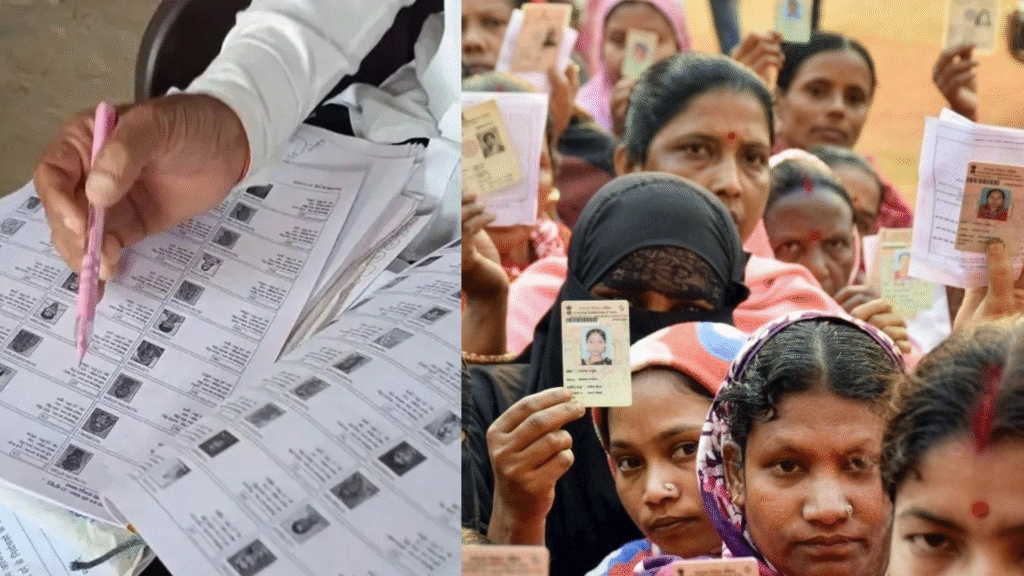
Introduction:
The Election Commission of India (ECI) is preparing to launch a nationwide Special Summary Revision (SSR) process after the Bihar Election. The objective of this process is to make the electoral roll more accurate and transparent by removing the names of deceased individuals and illegal immigrants. This initiative is expected to result in the deletion of approximately 15 crore (150 million) voters’ names, and new guidelines have been issued for new voters.
Purpose and Method of Electoral Roll Revision:
The Election Commission is committed to strengthening the foundation of the country’s democratic process through the revision of electoral rolls. The main objectives of this process are:
Prevention of Vote Fraud: To remove duplicate entries of the same person or names of bogus voters.
Transparency and Accuracy: To create an accurate and updated list by removing the names of deceased, shifted, or illegal immigrants from the electoral roll.
Integrity of the Democratic Process: To safeguard the country’s demographic structure and electoral process.
This process has already begun in the Bihar elections, and following its success, it will be implemented in other states and Union Territories across the country.
Major Concessions and Cut-off Dates by the Election Commission:
The Election Commission has granted some significant concessions in the electoral roll revision. For most states, the last revision of the electoral rolls took place between 2002 and 2004. These years will be considered as the cut-off dates for the subsequent SSR process.
Benefit for Old Voters: Voters whose names were included in the 2002-2004 electoral rolls and who are still residing at the same location will not be required to submit any new documents to prove their date or place of birth. This will benefit more than half of the country’s voters.
Estimated Deletion of 15 Crore Names: Currently, the number of voters in the country is approximately 100 crores (1 billion). Through this revision process, about 15 crore (150 million) fake, deceased, or shifted voters’ names may be removed from the list, reducing the number of genuine voters to approximately 85 crores (850 million).
Document Requirements for New Voters and Specific Groups:
While concessions have been granted to older voters, document requirements have been made stricter for new voters and certain specific groups:
Born After July 1, 1987: Individuals born after July 1, 1987, will need to submit their parents’ documents (birth certificate or proof of citizenship) to be included in the electoral roll.
Born Between July 1, 1987, and December 2, 2004: Those born during this period will need to show proof of their parents’ birth or citizenship.
Born After December 2, 2004: Individuals born after this date will need to prove that one of their parents is an Indian citizen and the other is not an illegal immigrant. This also requires parental documentation.
Non-Resident Indians (NRIs) and those who have migrated from other states will need to fill out an affidavit to register as new voters.
Changes in EVM and Ballot Papers:
The Election Commission has introduced some changes to make the electoral process more accurate and voter-friendly:
Color Photographs: From now on, candidates’ color photographs will be used on EVMs, which will help voters, especially the elderly, identify candidates. Previously, black and white photographs were used, which often caused confusion. This system has been effective since the Bihar Assembly elections.
Uniform Font Size: Candidates’ names on ballot papers will now be written in the same font size across the country, which will eliminate confusion caused by different font sizes in various states.
Legal Context and Political Reactions:
This SSR process has sparked many controversies in the past. The issue of linking Aadhaar cards with electoral rolls even reached the Supreme Court. Opposition parties, such as the Congress and RJD, questioned the electoral roll revision process and even accused the Election Commission of vote rigging. They also organized programs like “Voter Adhikar Yatra” (Voters’ Rights March).However, the Supreme Court gave a “clean chit” to the Election Commission on this matter, ruling that the Election Commission is an independent and autonomous body and has the right to make such decisions.
Conclusion:
The Election Commission is constantly striving to make the country’s democratic process more robust, transparent, and accurate. Electoral roll revision and the modernization of electoral equipment like EVMs are part of this effort. The nationwide SSR process, set to begin after the Bihar elections, will be considered a significant milestone in India’s electoral history, making future elections more credible.
